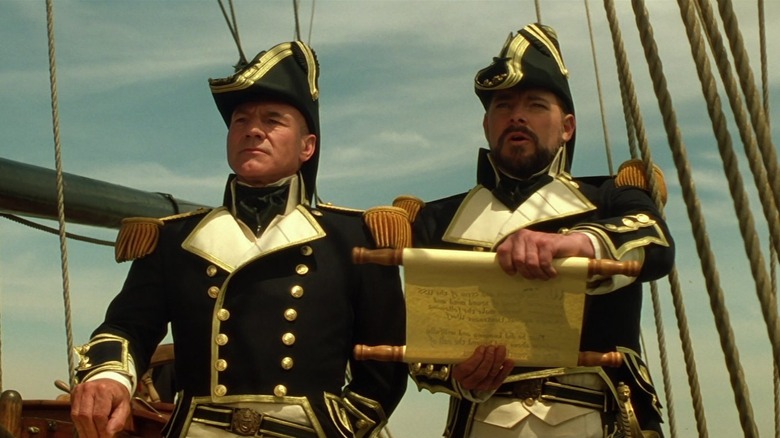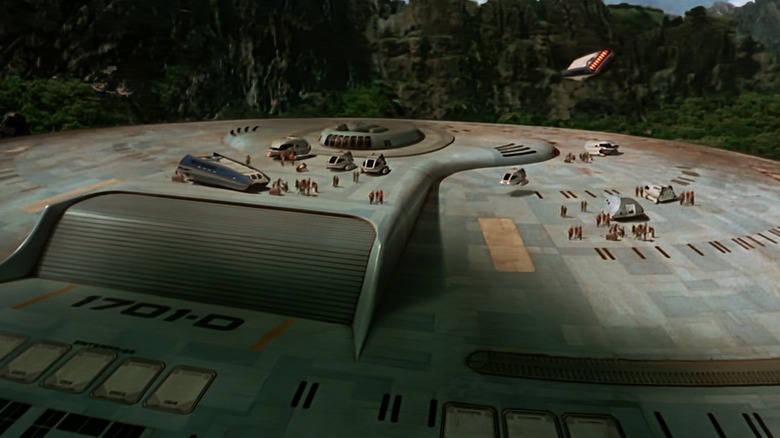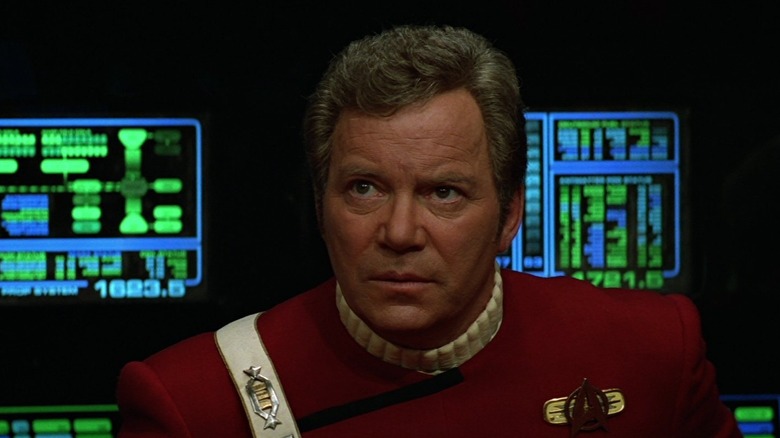Paramount Pitted Star Trek Writers Against Each Other To Get The Script For Generations
The final episode of "Star Trek: The Next Generation" — called "All Good Things..." — aired on May 23, 1994. It was an excellent send-off for the show, featuring a complex time-travel story about an eerie spatial phenomenon that gets larger the more it travels back in time ("Tenet," eat your heart out). Trekkies could likely have survived for many years on the satisfaction brought to them by "All Good Things..." Unwilling to leave well enough alone, however, Paramount immediately began production on "Star Trek: Generations," the first movie based on "Next Generation." The film opened in theaters on November 18, 1994, just under six months after we last saw the crew of the Enterprise-D. We didn't even get a chance to miss them.
"Generations" is less satisfying than "All Good Things...," as it features a magical temporal nexus that allows Captain Picard (Patrick Stewart) to come face-to-face with Captain Kirk (William Shatner). The film is all about tiresome passing-the-torch moments that it didn't need.
The screenplay for "Generations" is credited to longtime Trek handlers Ronald D. Moore and Brannon Braga. It turns out that they were the "winners" in an in-studio "write-off" orchestrated by producer Rick Berman. The idea was that Berman would hire two sets of writers to come up with a "Star Trek: The Next Generation" movie, and then make the script he liked better. The only known stipulation was that the cast of the original "Star Trek" might be directly involved.
In the oral history book "The Fifty-Year Mission: The Next 25 Years: From The Next Generation to J. J. Abrams," edited by Mark A. Altman and Edward Gross, Moore, Braga, and "Star Trek" producer Michael Piller all talked about the weirdness of Berman's "write-off," and how unfair it felt.
Can't we all just get along?
Piller was particularly incensed by the "competition" aspect of Rick Berman's scriptwriting "competition," saying that he didn't want to play against another screenwriter. He liked cooperation better. Piller said:
"From the studio's point of view, it made perfect business sense. Rick was a first-time feature producer, this was the studio's most lucrative franchise — why take a chance on one writer; why not have two scripts written and pick the best one? But from a writer's standpoint, there's something deeply discouraging about knowing that you're writing against someone and that one of you is wasting his or her time. Having guided the stories and the scripts for 'The Next Generation' for five years, I found it very difficult to participate in a contest and turned the offer down."
Braga and Moore, meanwhile, were keen to write a script. A movie — their first — was too tantalizing to turn down, and they got to work. Moore recalled ecstatically being offered a chance to write "Generations," and how he, at first, thought he was going to be let go. Moore said:
"We thought we were being fired. Rick said he wanted to meet with us and didn't tell us the reason. Brannon was sure the series was being canceled. We finally got over to Rick's office and we were both pale and he said, 'I've just completed two months of negotiations with the studio and I've been asked to produce the next two "Star Trek" movies. I want you boys to write one of them.' We just sort of stared at him, dumbstruck. It was completely out of left field."
Their mandate was, as mentioned, to include the characters from the original "Star Trek." Otherwise, it seemed like they were left to their own devices.
Battle of the Generations
The "other" script was offered to infamously sour "Trek" producer Maurice Hurley. Hurley's script was to feature transdimensional villains who pop in through a fissure in the space-time continuum. In order to return, however, they would have to rend our galaxy to shreds, killing many. The villains are so vicious and determined that Captain Picard, requiring a masterful tactician, recreated Captain Kirk on his ship's holodeck. Kirk, it would be explained, had knowledge of this particular enemy, and I guess that knowledge was stored in Kirk's holographic program. Picard and Kirk would have big fights on how to resolve the situation. It was Kirk vs. Picard.
That idea was ultimately not used, rejected in the "write-off."
Braga revealed that he didn't mind Berman's competition because, well, he was confident he would win. Hurley didn't have the rosiest reputation on the set of "Next Generation," and Braga seemed assured he would be able to write a better movie. Braga said:
"Rick eventually would ask us to write the first movie, although there were some complications there — we weren't his first choice. Paramount had a process where they wanted two scripts developed simultaneously so that they could pick the better one. Maurice Hurley was chosen for the other one. [...] Rick went to Ron and me and said, 'Will you write the first movie? And by the way, there's another script being done jointly.' And Ron and I, we could care less, it was going to be our script, of course, and it was. But that's how that went down."
"Generations" isn't terribly good, so it's hard to say if Hurley's script would have made a better movie. Braga's and Moore's script, however, was definitely "Star Trek."


